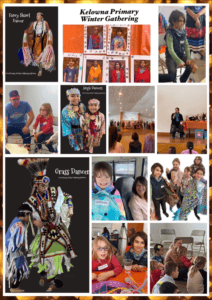
Indigenous Education June Newsletter
Limlmtx, Kukwstsétsemc, Suʔkni, (Thank you in Nsyilxcen, Secwépemctsin and Ktunaxa)
A huge thank you from the Indigenous Education department for another amazing year. We also would like to congratulate the seven graduates from RSS who will be receiving either a blanket representing the spirit of good things to come in the future and the warmth or our knowledge from the past, or a Metis sash which identifies and celebrates Metis heritage at the Graduation Ceremony on Friday. Congratulations to Justus Cameron, Clara Kenyon, Meya Musseau, Ze Ogilvie, Noah Page, Krystyna Portras, and Nyola Willms.
We also wanted to share some highlights with you from this past year and remind you of some of the things that we do. We hope you enjoy reading and hope you have a wonderful summer.
What does the Indigenous Education department do?
The SD 19 Indigenous Education Department supports Indigenous students culturally, socially, and academically. These one-to-one supports are individually tailored to each student’s unique set of strengths and stretches. Throughout the district, the department offers monthly Indigenous-focused activities and fieldtrips for classes K-12 that emphasize Indigenous Ways of Knowing and Being and encourage Reconciliation.
Highlights
• Randy William, a Secwepemc Elder-in-Training from the Splatsín Band has continued to travel to Revelstoke bi-weekly to visit Revelstoke classes.
• Donovan Timentwa, an Nsyilxcen language teacher from the Sinixt Confederacy in Inchellium, WA has been spending one day a month in each elementary school introducing Revelstoke students to this Salish language.
• Grade 3 Indigenous students were invited to the Primary Winter Gathering PowWow in Kelowna, a tradition we hope to continue in the future.
• The Ktunaxa invited us to join them as they harvested a white bark pine in the area and we are excited for the return of the Sturgeon Nosed Canoe that hung in the entrance at RSS once it has been renewed.
• A group of students from RSS attended the 2nd annual Indigenous Student Leadership Summit in Kamloops to share student voice about Anti-Racism with the Ministry.
• The Indigenous Department worked closely with the Professional Development Committee to offer an Indigenous Day of Learning in May. Students had asked us to help teachers and other district staff with opportunities to learn about Indigenous history and culture. It was very successful and we had great feedback.
Self-Indentification
Each year we ask Indigenous families to self-identify their Indigeneity to the district to ensure we are supporting all students to the best of our ability. As this is a self-identification process, status cards and other forms of official documents are not required. The Indigenous Education Department plans their supports and activities based on the number of self-identified Indigenous students in the district. This data is gained through the self-identification forms that are distributed each September, or can also be done online. The Indigenous Website will be live when we return in the fall, so we will send a reminder and instructions in September.
Free Tutoring
It’s almost the end of the school year and it would be wonderful to give First Nations families in your district access to free at-home reading tutoring so that their kids can strengthen their reading skills over the summer and start the new school year strong and confident.
The at-home tutoring program is funded through grants and donations from Canadian companies and foundations such as TD Canada Trust, the Future Generations Fund (formerly the National Indian Brotherhood), the HP Foundation, and through Jordan’s Principle.
About High Impact Tutoring
• Trained Early Literacy Interventionists work 1:1 with students for just 5-10-minutes per session, 3-5 times per week, using a family smartphone. If a family doesn’t have a smartphone/ internet, it will be provided at no cost to the family.
• Having frequent, short sessions of 1:1 tutoring—Chapter One’s “high impact” approach—is proven to improve student literacy outcomes and get them to grade level in reading.
• The program is available to students in grades K to Grade 5, and those in Grades 6 and 7 as a remedial tool.
The program is not a school-based intervention but an at-home intervention to give students who need it extra support.
If you have First Nations or Inuit students who have Status, or who have a parent or caregiver with Status, who could benefit from extra literacy support at home, please reach out— it is super easy to sign up families and then Chapter One does the rest! For more information, contact Alisa at alisa.henry@chapterone.org
Check out the 2024-2024 Programming post for highlights from the year.
Stay connected!
Please visit our website ied.sd19.bc.ca









